人教版英语八年级上册Unit 1 Where did you go on vacation? Section A语法课课件(2d-GF)(共30张PPT)
文档属性
| 名称 | 人教版英语八年级上册Unit 1 Where did you go on vacation? Section A语法课课件(2d-GF)(共30张PPT) | 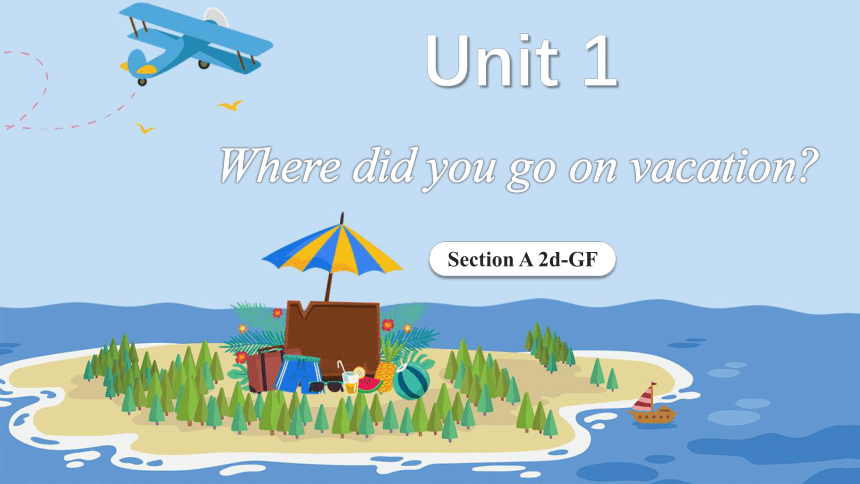 | |
| 格式 | pptx | ||
| 文件大小 | 78.3MB | ||
| 资源类型 | 教案 | ||
| 版本资源 | 人教新目标(Go for it)版 | ||
| 科目 | 英语 | ||
| 更新时间 | 2023-09-02 20:23:07 | ||
图片预览


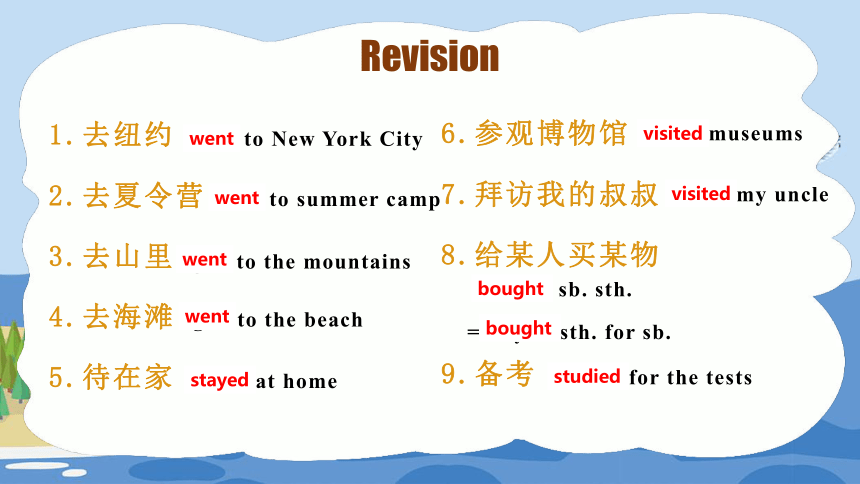

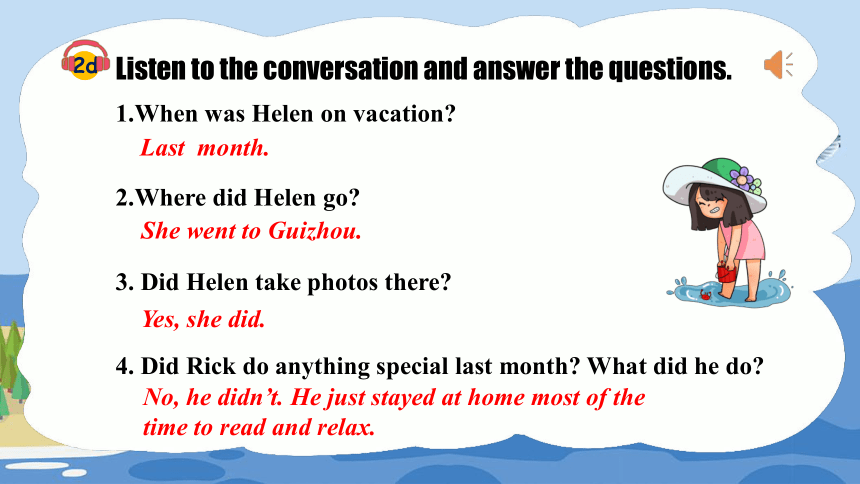
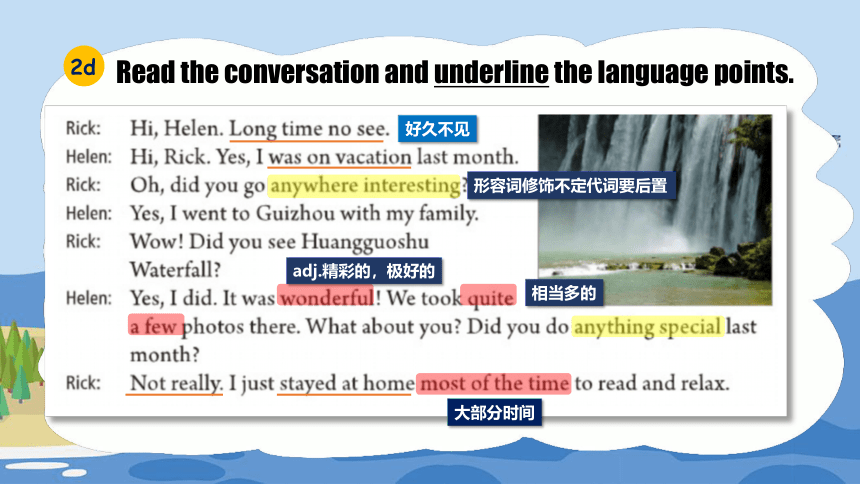
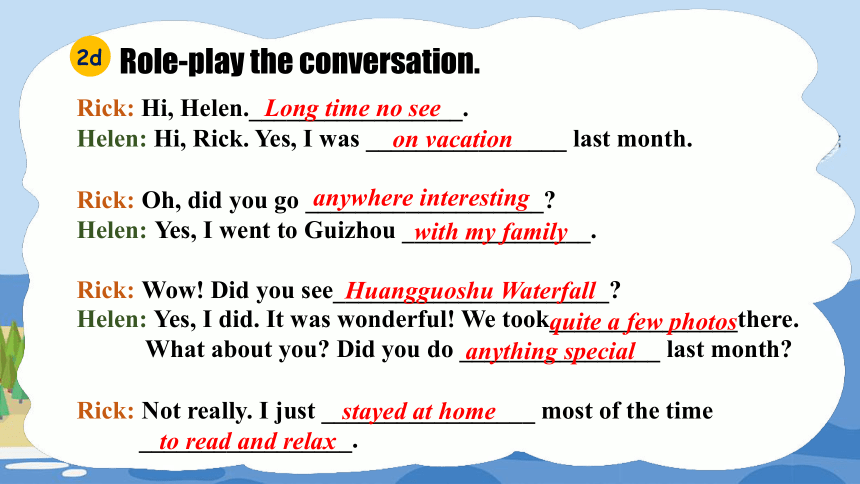
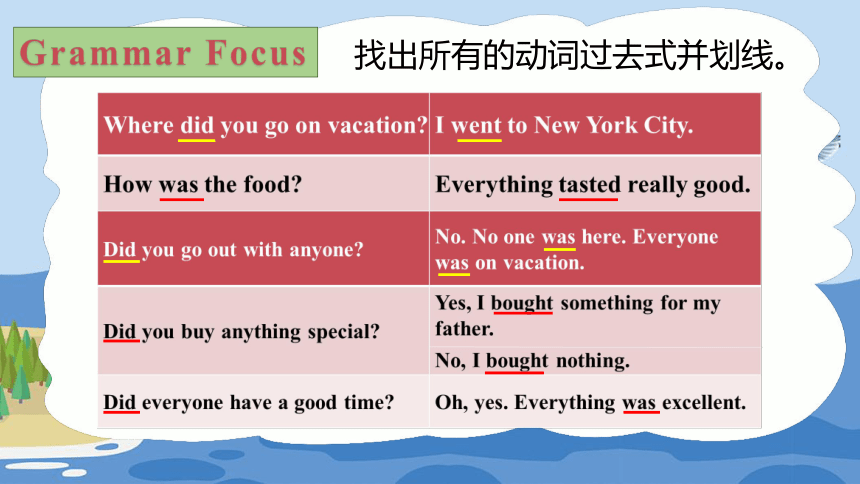
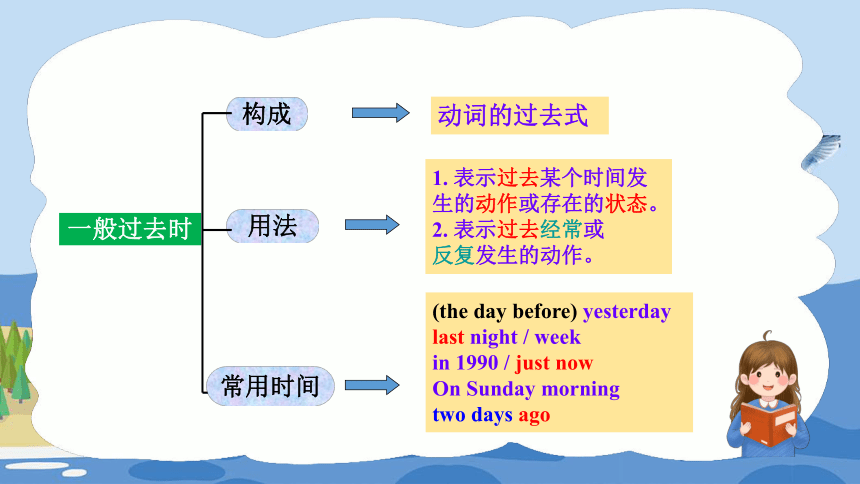
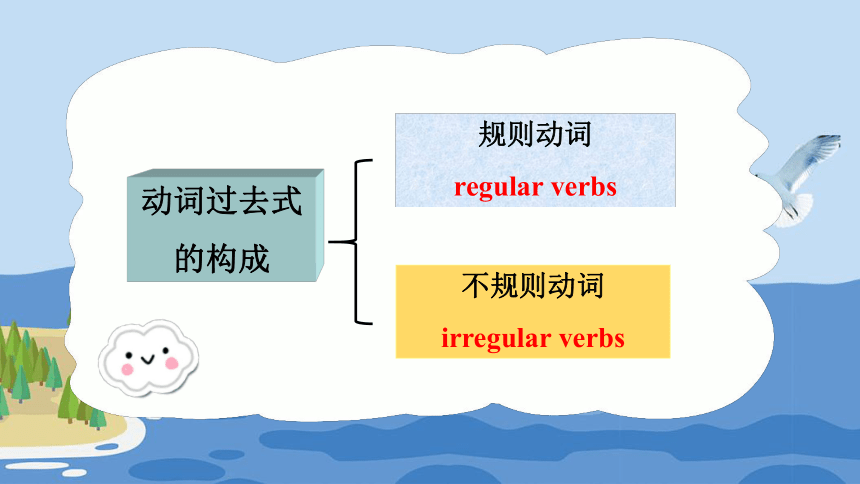
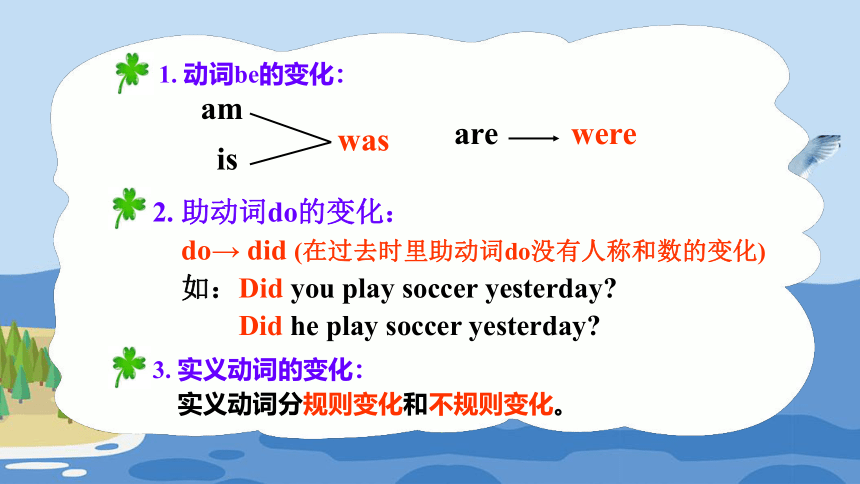
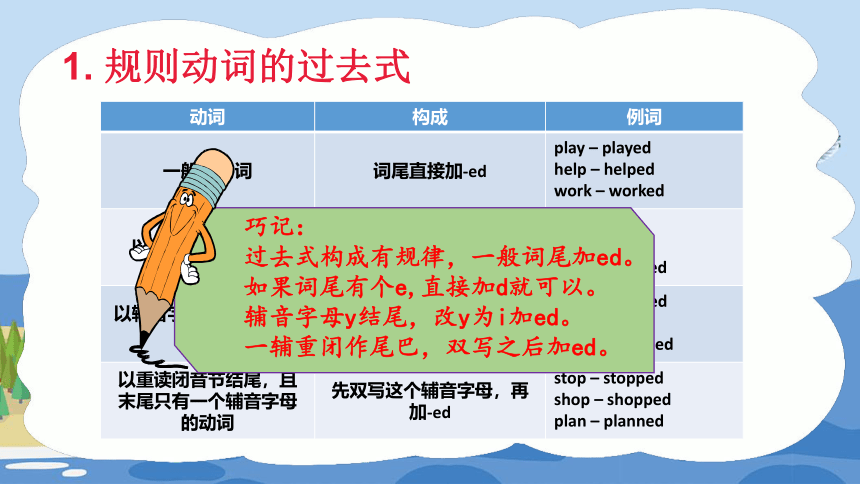
文档简介
(共30张PPT)
Where did you go on vacation
Section A 2d-GF
Unit 1
When I was young
I’d listen to the radio
Waiting for my favorite songs
When they played I’d sing along
It made me smile
Those were such happy times
and not so long ago
How I wondered
where they’d gone
But they’re back again
just like a long lost friend
All the songs I love so well
Every sha la la every wo’wo
still shines
Every shing-a-ling-a-ling
that they’re starting to sing
so fine
Yesterday Once More
go to New York City
1.去纽约
Revision
6.参观博物馆
2.去夏令营
7.拜访我的叔叔
3.去山里
8.给某人买某物
4.去海滩
9.备考
5.待在家
go to summer camp
go to the mountains
go to the beach
visit my uncle
visit museums
buy sb. sth.
= buy sth. for sb.
study for the tests
went
went
went
went
visited
visited
bought
bought
studied
stay at home
stayed
Where did Helen go on vacation
2d
Listen to the conversation and answer the questions.
1.When was Helen on vacation
2.Where did Helen go
3. Did Helen take photos there
4. Did Rick do anything special last month What did he do
Last month.
She went to Guizhou.
Yes, she did.
No, he didn’t. He just stayed at home most of the time to read and relax.
好久不见
形容词修饰不定代词要后置
adj.精彩的,极好的
相当多的
大部分时间
2d
Read the conversation and underline the language points.
Role-play the conversation.
Rick: Hi, Helen._________________.
Helen: Hi, Rick. Yes, I was ________________ last month.
Rick: Oh, did you go ___________________
Helen: Yes, I went to Guizhou _______________.
Rick: Wow! Did you see______________________
Helen: Yes, I did. It was wonderful! We took_______________there.
What about you Did you do ________________ last month
Rick: Not really. I just _________________ most of the time
_________________.
Long time no see
on vacation
anywhere interesting
with my family
Huangguoshu Waterfall
quite a few photos
anything special
stayed at home
to read and relax
2d
找出所有的动词过去式并划线。
Grammar Focus
构成
用法
动词的过去式
1. 表示过去某个时间发
生的动作或存在的状态。
2. 表示过去经常或
反复发生的动作。
(the day before) yesterday
last night / week
in 1990 / just now
On Sunday morning
two days ago
一般过去时
常用时间
动词过去式
的构成
规则动词
regular verbs
不规则动词
irregular verbs
1. 动词be的变化:
was
were
am
is
are
2. 助动词do的变化:
do→ did (在过去时里助动词do没有人称和数的变化)
如:Did you play soccer yesterday
Did he play soccer yesterday
3. 实义动词的变化:
实义动词分规则变化和不规则变化。
动词 构成 例词
一般的动词 词尾直接加-ed play – played
help – helped
work – worked
以字母e结尾的动词 词尾只加-d like – liked
live – lived
arrive – arrived
以辅音字母加y结尾的动词 变y为i,再加-ed study – studied
cry – cried
worry – worried
以重读闭音节结尾,且末尾只有一个辅音字母的动词 先双写这个辅音字母,再加-ed stop – stopped
shop – shopped
plan – planned
1. 规则动词的过去式
巧记:
过去式构成有规律,一般词尾加ed。
如果词尾有个e,直接加d就可以。
辅音字母y结尾,改y为i加ed。
一辅重闭作尾巴,双写之后加ed。
不规则动词的过去式变化各异,需要特殊记忆,每个不规则动词的变换形式都必须牢记。见课本P142—143。
2. 不规则动词的过去式
Past 过去
Now 现在
go to the movies
do my homework
play tennis
play soccer
clean the room
went to the movies
did my homework
played tennis
played soccer
cleaned the room
特殊疑问句:疑问词+did+主语+动词原形+其他?
一般疑问句:Did +主语+动词原形+其他?
When do you visit the Great Wall
→When did you visit the Great Wall
Do you have breakfast →Did you have breakfast
Yes, I do./ No, I don’t. Yes, I did./No, I didn’t.
1.It was sunny.
2.I did my homework yesterday.
3.She played soccer last Sunday.
4.He cleaned his room last week.
Did you do your homework yesterday
Did she play soccer last Sunday
Did he clean his homework last week
Was it sunny
改成一般疑问句
动词一般过去时, 表示过去发生的事;
be用was或用were, have,has变had;
谓语动词过去式, 过去时间作标志;
一般动词加-ed, 若是特殊得硬记。
否定句很简单, 主语之后didn’t添;
疑问句也不难, did放在主语前;
如果谓语之前有did,谓语动词需还原;
动词若是was,were, 否定就把not添。
Summary
Read it again and try to recite it.
___________________________ (你去哪度假了?)
I went to New York City.
___________________________ (你和某人一起出去的吗?) No. ________(没人) was here. ________(每个人) was on vacation.
___________________________ (你有买任何特别的东西吗?) Yes, I bought ________ (一些东西) for my father.
No, l bought ________(没有东西).
___________________________ (食物怎么样?) ___________ (所有东西) tasted really good!
___________________________ (每个人都玩的开心吗?) Oh, yes. ___________(一切) was excellent.
Grammar
F o c u s
Where did you go on vacation
Did you go out with anyone
Did you buy anything special
How was the food
Did everyone have a good time
No one
Everyone
something
nothing
Everything
Everything
复合不定代词 -one -body -thing
一些 some someone somebody something
任何 any anyone anybody anything
每一 every everyone everybody everything
无 no no one nobody nothing
1. 复合不定代词的定义
由some, any, no, every分别加上-one, -body, -thing构成的不定代词叫做复合不定代词。
用法
构成
定义
2. 它们是如何构成的?
复合不定代词 -one -body -thing
一些 some- someone somebody something
任何 any- anyone anybody anything
每一 every- everyone everybody everything
无 no- no one nobody nothing
用法
定义
构成
指代人
指代物
复合不定代词的用法
1.买特别的东西
2.做无聊的事
3.有重要的事
4.没什么有趣的
5.不同的事
6.没什么开心的
7.有用的东西
8.需要些喝的东西
buy something special
do something boring
have something important
nothing interesting
something different
nothing fun
something useful
need something to drink
构成
定义
用法
不定代词在什么位置?
1.形容词和不定式要放在不定代词之后
复合不定代词的用法
1) 所有人都认识他。
Everyone knows him.
2) 有什么有趣的事吗?
Is there anything interesting
3) 今天的报纸上没有什么新内容。
There is nothing new on today's newspaper.
4) 世上无难事,只怕有心人。
Nothing is difficult if you put your heart into it.
构成
定义
用法
谓语动词用什么形式?
2.谓语动词都用单数
复合不定代词的用法
1)有人认识他。
Someone knows him.
2)要些吃的东西吗?
Would you like something to eat?
3)有什么有趣的事吗?
Is there anything interesting
4)无论什么都行。
Anything is OK.
5) 在岛上,我没遇见任何人。
I can’t meet anybody on the island.
含some或any的复合不定代词用法?
3.含some的:
(1)常用肯定句
(2)问句表请求,建议(期待肯定答复)
4.含any的:
(1)常用否、问句
(2)肯定句中表“任
何;无论...”
复合代词有特长,修饰成分放后边。
如果它来作主语,谓语单数没商量。
some- 代词肯定句,any- 代词否、疑忙。
若是希望得肯定,some- 代词不相让。
巧记复合不定代词的用法
Exercises
Linda: Did you do___________ fun on your vacation, Alice
Alice: Yes, I did. I went to Sanya.
Linda: How did you like it
Alice: Well, it was my first time there, so ___________ was really interesting.
Linda: Did you go with ___________
Alice: Yes, I did. I went with my sister.
Linda: Did you go shopping
Alice: Of course! I bought ___________ for my parents, but ___________ for myself.
Linda: Why didn’t you buy ___________ for yourself
Alice: I didn’t really see ___________ I liked.
Fill in the blanks with the words in the box and
practice the conversation.
anyone
something
anything
everything
nothing
anything
everything
anyone
something
nothing
anything
anything
=What do you think of it
=Sure/ Certainly
3a
Dear Bill,
How was your vacation Did you do ___________ interesting Did ___________ in the family go with you I went to a friend’s farm in the countryside with my family. ___________ was great. We fed some hens and saw some baby pigs. They were so cute! The only problem was that there was ___________ much to do in the evening but read. Still ___________ seemed to be bored. Bye for now!
Mark
3b
Fill in the blanks in the e-mail message with the words in the box.
anything everything nothing
everyone no one
anything
everyone
Everything
no one
无....
而只能....
There was nothing much to do in the evening but to read.
\
在nothing...but...结构中:前有do/does/did, but后省to;反之则but后必有to
nothing
Exercises
There was nothing much to do in the evening but to read.
\
在nothing...but...结构中:前有do/does/did, but后省to;反之则but后必有to
我无话可说,只能保持沉默。
1. I have nothing to say ________ to keep quiet.
2. The man lives for nothing but ________(make) money.
3. 除了等待,我无事可做。
这人除了赚钱,别无他求。
I have nothing to do but wait.
but
to make
Dear Bill,
How was your vacation Did you do ___________ interesting Did ___________ in the family go with you I went to a friend’s farm in the countryside with my family. ___________ was great. We fed some hens and saw some baby pigs. They were so cute! The only problem was that there was ___________ much to do in the evening but read. Still ___________ seemed to be bored. Bye for now!
Mark
3b
Fill in the blanks in the e-mail message with the words in the box.
anything everything nothing
everyone no one
anything
anyone
Everything
no one
无....
而只能....
nothing
Exercises
seem (+to be)+n./adj. “似乎……;好像……”,说明主语的特征或状态。
seem like+名词 似乎/好像……
seem to do sth. 似乎/好像做某事
It seems/seemed that … 看起来好像/似乎……
Ask your group questions about their last vacation. Then tell the class your results and give an oral report.
Did you… Everyone Someone (write the classmate’s name) No one
eat anything at a restaurant
read anything interesting
visit anyone in your family
buy anything
keep a diary
3c
In our group, everyone ate something at a restaurant...
… read something interesting.
… visited his uncle in the town.
… bought something special.
… kept a diary.
背诵Grammar Focus 部分。
复习动词过去式和复合不定代词的用法。
Homework
Where did you go on vacation
Section A 2d-GF
Unit 1
When I was young
I’d listen to the radio
Waiting for my favorite songs
When they played I’d sing along
It made me smile
Those were such happy times
and not so long ago
How I wondered
where they’d gone
But they’re back again
just like a long lost friend
All the songs I love so well
Every sha la la every wo’wo
still shines
Every shing-a-ling-a-ling
that they’re starting to sing
so fine
Yesterday Once More
go to New York City
1.去纽约
Revision
6.参观博物馆
2.去夏令营
7.拜访我的叔叔
3.去山里
8.给某人买某物
4.去海滩
9.备考
5.待在家
go to summer camp
go to the mountains
go to the beach
visit my uncle
visit museums
buy sb. sth.
= buy sth. for sb.
study for the tests
went
went
went
went
visited
visited
bought
bought
studied
stay at home
stayed
Where did Helen go on vacation
2d
Listen to the conversation and answer the questions.
1.When was Helen on vacation
2.Where did Helen go
3. Did Helen take photos there
4. Did Rick do anything special last month What did he do
Last month.
She went to Guizhou.
Yes, she did.
No, he didn’t. He just stayed at home most of the time to read and relax.
好久不见
形容词修饰不定代词要后置
adj.精彩的,极好的
相当多的
大部分时间
2d
Read the conversation and underline the language points.
Role-play the conversation.
Rick: Hi, Helen._________________.
Helen: Hi, Rick. Yes, I was ________________ last month.
Rick: Oh, did you go ___________________
Helen: Yes, I went to Guizhou _______________.
Rick: Wow! Did you see______________________
Helen: Yes, I did. It was wonderful! We took_______________there.
What about you Did you do ________________ last month
Rick: Not really. I just _________________ most of the time
_________________.
Long time no see
on vacation
anywhere interesting
with my family
Huangguoshu Waterfall
quite a few photos
anything special
stayed at home
to read and relax
2d
找出所有的动词过去式并划线。
Grammar Focus
构成
用法
动词的过去式
1. 表示过去某个时间发
生的动作或存在的状态。
2. 表示过去经常或
反复发生的动作。
(the day before) yesterday
last night / week
in 1990 / just now
On Sunday morning
two days ago
一般过去时
常用时间
动词过去式
的构成
规则动词
regular verbs
不规则动词
irregular verbs
1. 动词be的变化:
was
were
am
is
are
2. 助动词do的变化:
do→ did (在过去时里助动词do没有人称和数的变化)
如:Did you play soccer yesterday
Did he play soccer yesterday
3. 实义动词的变化:
实义动词分规则变化和不规则变化。
动词 构成 例词
一般的动词 词尾直接加-ed play – played
help – helped
work – worked
以字母e结尾的动词 词尾只加-d like – liked
live – lived
arrive – arrived
以辅音字母加y结尾的动词 变y为i,再加-ed study – studied
cry – cried
worry – worried
以重读闭音节结尾,且末尾只有一个辅音字母的动词 先双写这个辅音字母,再加-ed stop – stopped
shop – shopped
plan – planned
1. 规则动词的过去式
巧记:
过去式构成有规律,一般词尾加ed。
如果词尾有个e,直接加d就可以。
辅音字母y结尾,改y为i加ed。
一辅重闭作尾巴,双写之后加ed。
不规则动词的过去式变化各异,需要特殊记忆,每个不规则动词的变换形式都必须牢记。见课本P142—143。
2. 不规则动词的过去式
Past 过去
Now 现在
go to the movies
do my homework
play tennis
play soccer
clean the room
went to the movies
did my homework
played tennis
played soccer
cleaned the room
特殊疑问句:疑问词+did+主语+动词原形+其他?
一般疑问句:Did +主语+动词原形+其他?
When do you visit the Great Wall
→When did you visit the Great Wall
Do you have breakfast →Did you have breakfast
Yes, I do./ No, I don’t. Yes, I did./No, I didn’t.
1.It was sunny.
2.I did my homework yesterday.
3.She played soccer last Sunday.
4.He cleaned his room last week.
Did you do your homework yesterday
Did she play soccer last Sunday
Did he clean his homework last week
Was it sunny
改成一般疑问句
动词一般过去时, 表示过去发生的事;
be用was或用were, have,has变had;
谓语动词过去式, 过去时间作标志;
一般动词加-ed, 若是特殊得硬记。
否定句很简单, 主语之后didn’t添;
疑问句也不难, did放在主语前;
如果谓语之前有did,谓语动词需还原;
动词若是was,were, 否定就把not添。
Summary
Read it again and try to recite it.
___________________________ (你去哪度假了?)
I went to New York City.
___________________________ (你和某人一起出去的吗?) No. ________(没人) was here. ________(每个人) was on vacation.
___________________________ (你有买任何特别的东西吗?) Yes, I bought ________ (一些东西) for my father.
No, l bought ________(没有东西).
___________________________ (食物怎么样?) ___________ (所有东西) tasted really good!
___________________________ (每个人都玩的开心吗?) Oh, yes. ___________(一切) was excellent.
Grammar
F o c u s
Where did you go on vacation
Did you go out with anyone
Did you buy anything special
How was the food
Did everyone have a good time
No one
Everyone
something
nothing
Everything
Everything
复合不定代词 -one -body -thing
一些 some someone somebody something
任何 any anyone anybody anything
每一 every everyone everybody everything
无 no no one nobody nothing
1. 复合不定代词的定义
由some, any, no, every分别加上-one, -body, -thing构成的不定代词叫做复合不定代词。
用法
构成
定义
2. 它们是如何构成的?
复合不定代词 -one -body -thing
一些 some- someone somebody something
任何 any- anyone anybody anything
每一 every- everyone everybody everything
无 no- no one nobody nothing
用法
定义
构成
指代人
指代物
复合不定代词的用法
1.买特别的东西
2.做无聊的事
3.有重要的事
4.没什么有趣的
5.不同的事
6.没什么开心的
7.有用的东西
8.需要些喝的东西
buy something special
do something boring
have something important
nothing interesting
something different
nothing fun
something useful
need something to drink
构成
定义
用法
不定代词在什么位置?
1.形容词和不定式要放在不定代词之后
复合不定代词的用法
1) 所有人都认识他。
Everyone knows him.
2) 有什么有趣的事吗?
Is there anything interesting
3) 今天的报纸上没有什么新内容。
There is nothing new on today's newspaper.
4) 世上无难事,只怕有心人。
Nothing is difficult if you put your heart into it.
构成
定义
用法
谓语动词用什么形式?
2.谓语动词都用单数
复合不定代词的用法
1)有人认识他。
Someone knows him.
2)要些吃的东西吗?
Would you like something to eat?
3)有什么有趣的事吗?
Is there anything interesting
4)无论什么都行。
Anything is OK.
5) 在岛上,我没遇见任何人。
I can’t meet anybody on the island.
含some或any的复合不定代词用法?
3.含some的:
(1)常用肯定句
(2)问句表请求,建议(期待肯定答复)
4.含any的:
(1)常用否、问句
(2)肯定句中表“任
何;无论...”
复合代词有特长,修饰成分放后边。
如果它来作主语,谓语单数没商量。
some- 代词肯定句,any- 代词否、疑忙。
若是希望得肯定,some- 代词不相让。
巧记复合不定代词的用法
Exercises
Linda: Did you do___________ fun on your vacation, Alice
Alice: Yes, I did. I went to Sanya.
Linda: How did you like it
Alice: Well, it was my first time there, so ___________ was really interesting.
Linda: Did you go with ___________
Alice: Yes, I did. I went with my sister.
Linda: Did you go shopping
Alice: Of course! I bought ___________ for my parents, but ___________ for myself.
Linda: Why didn’t you buy ___________ for yourself
Alice: I didn’t really see ___________ I liked.
Fill in the blanks with the words in the box and
practice the conversation.
anyone
something
anything
everything
nothing
anything
everything
anyone
something
nothing
anything
anything
=What do you think of it
=Sure/ Certainly
3a
Dear Bill,
How was your vacation Did you do ___________ interesting Did ___________ in the family go with you I went to a friend’s farm in the countryside with my family. ___________ was great. We fed some hens and saw some baby pigs. They were so cute! The only problem was that there was ___________ much to do in the evening but read. Still ___________ seemed to be bored. Bye for now!
Mark
3b
Fill in the blanks in the e-mail message with the words in the box.
anything everything nothing
everyone no one
anything
everyone
Everything
no one
无....
而只能....
There was nothing much to do in the evening but to read.
\
在nothing...but...结构中:前有do/does/did, but后省to;反之则but后必有to
nothing
Exercises
There was nothing much to do in the evening but to read.
\
在nothing...but...结构中:前有do/does/did, but后省to;反之则but后必有to
我无话可说,只能保持沉默。
1. I have nothing to say ________ to keep quiet.
2. The man lives for nothing but ________(make) money.
3. 除了等待,我无事可做。
这人除了赚钱,别无他求。
I have nothing to do but wait.
but
to make
Dear Bill,
How was your vacation Did you do ___________ interesting Did ___________ in the family go with you I went to a friend’s farm in the countryside with my family. ___________ was great. We fed some hens and saw some baby pigs. They were so cute! The only problem was that there was ___________ much to do in the evening but read. Still ___________ seemed to be bored. Bye for now!
Mark
3b
Fill in the blanks in the e-mail message with the words in the box.
anything everything nothing
everyone no one
anything
anyone
Everything
no one
无....
而只能....
nothing
Exercises
seem (+to be)+n./adj. “似乎……;好像……”,说明主语的特征或状态。
seem like+名词 似乎/好像……
seem to do sth. 似乎/好像做某事
It seems/seemed that … 看起来好像/似乎……
Ask your group questions about their last vacation. Then tell the class your results and give an oral report.
Did you… Everyone Someone (write the classmate’s name) No one
eat anything at a restaurant
read anything interesting
visit anyone in your family
buy anything
keep a diary
3c
In our group, everyone ate something at a restaurant...
… read something interesting.
… visited his uncle in the town.
… bought something special.
… kept a diary.
背诵Grammar Focus 部分。
复习动词过去式和复合不定代词的用法。
Homework
同课章节目录
- Unit 1 Where did you go on vacation?
- Section A
- Section B
- Unit 2 How often do you exercise?
- Section A
- Section B
- Unit 3 I'm more outgoing than my sister.
- Section A
- Section B
- Unit 4 What's the best movie theater?
- Section A
- Section B
- Unit 5 Do you want to watch a game show?
- Section A
- Section B
- Unit 6 I'm going to study computer science.
- Section A
- Section B
- Unit 7 Will people have robots?
- Section A
- Section B
- Unit 8 How do you make a banana milk shake?
- Section A
- Section B
- Unit 9 Can you come to my party?
- Section A
- Section B
- Unit 10 If you go to the party, you'll have a grea
- Section A
- Section B
